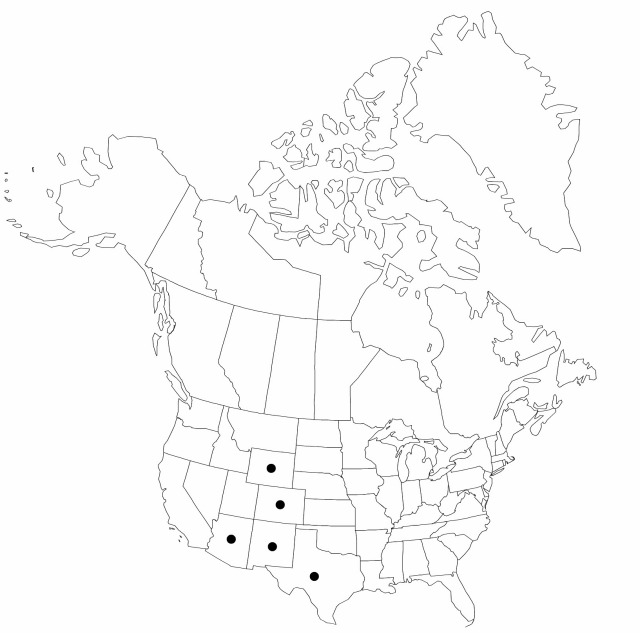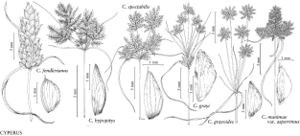Cyperus fendlerianus
Linnaea 35: 520. 1868.
Herbs, perennial, rhizomatous. Culms trigonous, (7–) 20–70 (–85) cm × (0.5–) 1–1.8 (–2.6) mm, glabrous or sparsely to densely scabridulous on surfaces or on angles immediately proximal to inflorescence in distal 3–6 cm. Leaves 2–3, flat to V-shaped, (12–) 20–40 (–55) cm × (2–) 3–5 (–7) mm. Inflorescences: spikes (1–) 3–4 (–6), largest erect, others at base of central spike, erect spike sessile, loosely to densely cylindric to ovoid-cylindric, (12–) 18–30 × (6–) 12–20 mm, remaining spikes 1/2 as large; rays absent; bracts (2–) 3–6 (–10), ± horizontal to reflexed parallel to culm, (2–) 6–16 (–25) cm × (1.5–) 2–4 (–7) mm; rachilla ± deciduous, wingless. Spikelets (8–) 15–30, spreading to ascending-appressed, oblong-lanceoloid, quadrangular, slightly compressed, 5–8 (–10) × (2–) 2.4–3.4 (–4.2) mm; floral scales (2–) 4–6 (–8), yellowish, reddish, or greenish brown, medially greenish, straight to excurved, laterally (2–) 3–4 (–5) -ribbed, medially (1–) 3– (–5) -ribbed, ovate-orbiculate, 2.4–2.8 (–3.4) × 2.4–2.8 (–3.4) mm, apex obtuse, mucronate to cuspidate, stout, (0.1–) 0.3–0.6 mm, medially glabrous. Flowers: anthers 0.4–0.8 mm; styles 0.7–1.3 mm; stigmas 0.7–1.2 mm. Achenes finely reticulate, brown to reddish-brown, ± stipelike, obovoid, 1.6–1.9 × 1.1–1.4 (–1.6) mm, base attenuate to cuneate, 0.1–0.2 × 0.2 mm, apex obtuse, apiculate, surfaces glabrous.
Phenology: Fruiting summer.
Habitat: Clearings in montane forests
Elevation: 500–1800 m
Distribution

Ariz., Colo., N.Mex., Tex., Wyo., Mexico
Discussion
Hybridization between Cyperus fendlerianus and C. sphaerolepis occurs occasionally in the southwestern United States and northern Mexico (B. G. Marcks 1972). The unnamed hybrid appears to be fully fertile and can be recognized by morphologic intermediacy.
Selected References
None.
Lower Taxa
"shortened" is not a number.
